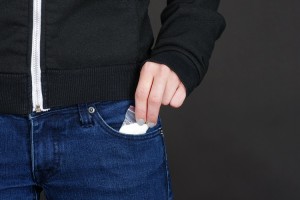 With the rise of illicit and street drugs on college campuses, students are faced with a choice to use drugs during their academic careers, including cocaine. While students in college have heightened rates of heavy drinking, among other behaviors, not much is known about trends regarding cocaine use among college students.
With the rise of illicit and street drugs on college campuses, students are faced with a choice to use drugs during their academic careers, including cocaine. While students in college have heightened rates of heavy drinking, among other behaviors, not much is known about trends regarding cocaine use among college students.
Cocaine use is in fact a growing issue on college campuses, with national reports showing an increase in use among students and young adults, with an estimated 5% of college students using cocaine during their time in school [1,2].
Research has shown that almost 70 percent of cocaine users began the drug after college entry, with a lifetime prevalence of cocaine use tripling from year 1 to year 4 [3]. These findings are significant and warrant greater attention about the use of this illicit drug on college campuses. What exactly is cocaine and what makes it appealing among students?
The Effects of Cocaine
 Cocaine is a highly addictive stimulant drug that is obtained from the leaves of the coca plant or artificially synthesized [4]. Cocaine directly impacts the central nervous system and induces increased heart rate, blood pressure, euphoric feelings, hyperactivity, alertness, and competence upon intake.
Cocaine is a highly addictive stimulant drug that is obtained from the leaves of the coca plant or artificially synthesized [4]. Cocaine directly impacts the central nervous system and induces increased heart rate, blood pressure, euphoric feelings, hyperactivity, alertness, and competence upon intake.
This drug can be administered by smoking, snorting, inhaling, or through a suppository. The effects that are induced upon immediate intake often appeal to college students, who are looking for increased stimulation to study, party, or keep up with the demands of an overloaded schedule.
Where are College Students Using Cocaine?
Cocaine is also considered to be a “club drug”, as its effects on users produces heightened euphoric sensations and increased pleasure. For these reasons cocaine is commonly used at:
- College Parties
- Raves
- The Club Scene
College students may find themselves turning to cocaine use for various reasons. Whether due to exposure, the desire to fit in with fellow students, or facing pressure to use drugs, a college student may be vulnerable to cocaine use. Other students may turn to cocaine as a means of dealing with overwhelming stress or circumstances that seem out of their control. Students may find that cocaine helps them “escape” from their reality and consume this drug as it may be more readily available than other street drugs.
Negative Effects from Cocaine Use
 While the high that students may experience from cocaine use is appealing, the “comedown”, or withdrawal of cocaine from the body, can produce devastating consequences. Regardless of the frequency which a student is using cocaine, risks of consuming this street drug include adverse physical and psychological effects, including tremors, convulsions, anxiety, restlessness, paranoia, and adverse cardiac events [5].
While the high that students may experience from cocaine use is appealing, the “comedown”, or withdrawal of cocaine from the body, can produce devastating consequences. Regardless of the frequency which a student is using cocaine, risks of consuming this street drug include adverse physical and psychological effects, including tremors, convulsions, anxiety, restlessness, paranoia, and adverse cardiac events [5].
Whether the use of cocaine is occasional or prolonged, students who consume cocaine during their college career will suffer damaging effects. Because of the highly addictive nature of this drug, it is difficult to quit without the assistance of a professional addiction team.
How to Help Someone Who is Abusing Cocaine
If you suspect someone you care for is abusing cocaine while in college, it is important to help direct them toward the help they will need to overcome it. If unaddressed, cocaine use can drastically change the life of its abuser for the worst, possibly even losing their ability to finish college successfully.
The following signs and symptoms may indicate that your loved one is suffering with a cocaine addiction:
- Physical Symptoms: Restlessness, loss of appetite, extreme weight loss, disrupted sleep cycles, bloodshot eyes, tremors, excessive sweating and chills are all physical symptoms that may be present in the case of cocaine use.
- Behavioral Signs: Changes in social interactions and behaviors may result with cocaine use, including lack of interest in normal activities, increased isolation, minimal effort in school or work obligations, strained relationships, and decreased personal hygiene and care.
- Emotional Signs: Many mood changes will incur from cocaine use, including lapses in judgment, increased anxiety or paranoia, depression or confusion, panic attacks, increased agitation, or suicidal ideations.
As a college student who may be exposed to cocaine and/or using the street drug regularly, it is crucial to seek out treatment for cocaine addiction as early as possible. If you are unsure where to start, consider seeking out available resources through the Wellness Center on your college campus or connecting with a student mentor or counselor.
If you are a parent and suspect that your child might be abusing cocaine while in college, it is important to have an open and honest discussion about your concerns. Communicating with your college student in a safe place in which you can lovingly express your observations as well as direct towards help and treatment. In some instances, it may be necessary to take a medical leave from college in order to appropriately and professionally treat a cocaine addiction.
Cocaine Crushes Academic Dreams
 While the use of cocaine may appear to be glamorous or socially acceptable as part of the culture on college campuses, nothing could be farther from the truth. The use of cocaine can destroy any dreams or aspirations to find academic success during college, as well as deter a person from self-development and growth during a time of potential and promise.
While the use of cocaine may appear to be glamorous or socially acceptable as part of the culture on college campuses, nothing could be farther from the truth. The use of cocaine can destroy any dreams or aspirations to find academic success during college, as well as deter a person from self-development and growth during a time of potential and promise.
If you or someone you care for is struggling with cocaine use during your time at college, realize that you can get the help you need to regain your life back through sobriety. Likewise, college administrators and staff can use this information to help develop greater prevention strategies on campus in effort to address this growing problem.
Community Discussion – Share Your Thoughts Here!
Do you have a story about drug use hurting academic dreams?
 About the Author:
About the Author:
Crystal Karges, MS, RDN, IBCLC, is a Masters-level Registered Dietitian Nutritionist (RDN) with a specialty focus in eating disorders, maternal/child health and wellness, and intuitive eating. Combining clinical experience with a love of social media and writing, Crystal serves as the Director of Content and Social Media for Eating Disorder Hope/Addiction Hope, where her passion to help others find recovery and healing is integrated into each part of her work.
As a Certified Intuitive Eating Counselor, Crystal has dedicated her career to helping others establish a healthy relationship with food and body through her work with EDH/AH and nutrition private practice.
References:
[1]: Substance Abuse and Mental Health Services Administration. Results from the 2007 National Survey on Drug Use and Health: National findings (DHHS Publication No. SMA 08-4343) Rockville, MD: Office of Applied Studies; 2008.
[2]: Johnston LD, O’Malley PM, Bachman JG, Schulenberg JE. Monitoring the Future national survey results on drug use, 1975–2006: Volume II, College students and adults ages 19–45 (NIH Publication No. 07-6206) Bethesda, MD: National Institute on Drug Abuse; 2007
[3]: Kasperski, Sarah, et al. College students’ use of cocaine: results from a longitudinal study. Addict Behav Apr 2011; 36(4): 408-411.
[4]: Aggrawal, Anil (1995). Narcotic Drugs. National Book Trust, India. pp. 52–3. ISBN 978-81-237-1383-0
[5]: World Health Organization (2004). Neuroscience of psychoactive substance use and dependence. p. 89. ISBN 9789241562355.
The opinions and views of our guest contributors are shared to provide a broad perspective of addictions. These are not necessarily the views of Addiction Hope, but an effort to offer discussion of various issues by different concerned individuals.
We at Addiction Hope understand that addictions result from a combination of environmental and genetic factors. If you or a loved one are suffering from an addiction, please know that there is hope for you, and seek immediate professional help.
Last Updated & Reviewed By: Jacquelyn Ekern, MS, LPC on October 20, 2016
Published on AddictionHope.com
